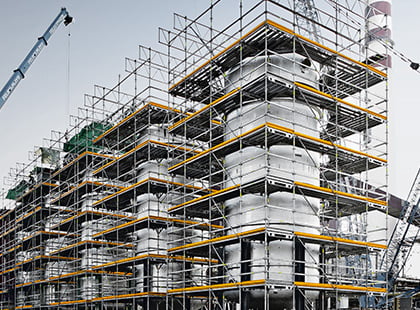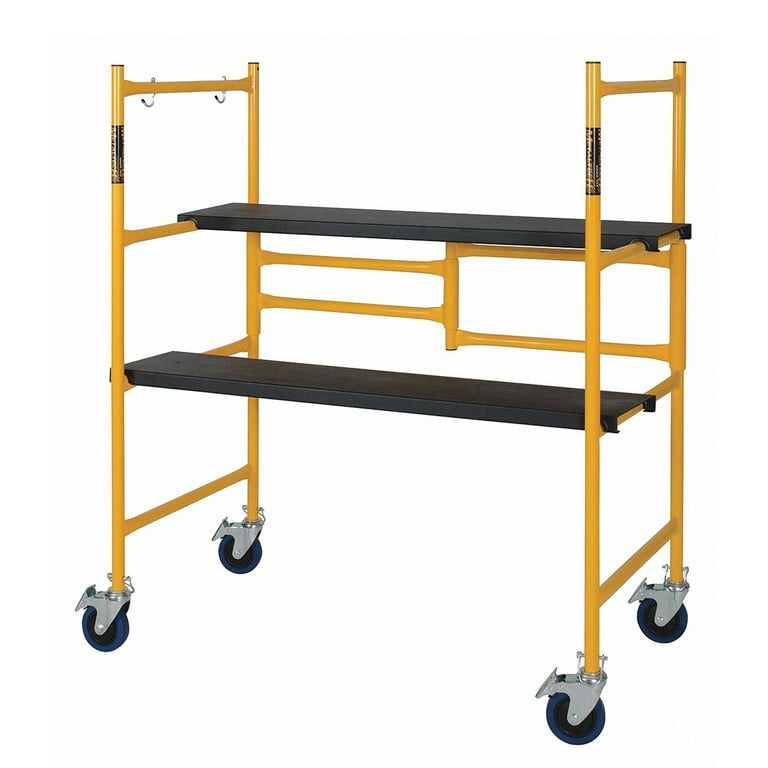Find Reliable Scaffolding Services in Surrey for Your Project Needs
Checking Out the Numerous Kinds Of Scaffolding Utilized in Building Projects
The construction market relies heavily on various sorts of scaffolding to satisfy particular job demands, each offering unique advantages and applications. Conventional frame scaffolding offers a durable foundation for basic tasks, while suspended scaffolding is crucial for service skyscraper structures. Other alternatives, such as system and rolling scaffolding, deal with effectiveness and mobility, specifically. The cantilever alternative shows important in city settings where area is constrained. Recognizing the nuances of these scaffolding types is essential for maximizing security and performance on building and construction websites, prompting a better evaluation of their unique features and applications.

Traditional Frame Scaffolding
Conventional frame scaffolding is among the most commonly used methods in the building market due to its robustness and versatility. This system contains vertical and horizontal frameworks that are constructed to create a secure platform for workers and materials. The primary elements include vertical articles, straight journals, and diagonal dental braces, which with each other give a strong structure that can support considerable tons.
One of the essential benefits of standard frame scaffolding is its versatility to numerous building tasks, ranging from household structures to large industrial structures. The modular style permits simple assembly and disassembly, making it efficient for both short-term and lasting tasks. Furthermore, the system can be customized in height and size, suiting different structure designs and site conditions.
Safety and security is vital in scaffolding applications, and traditional framework systems are furnished with guardrails and toe boards to stop drops and make certain worker protection. Regular evaluations and adherence to safety and security regulations are important in maintaining the stability of the scaffold (Scaffolding). On the whole, traditional framework scaffolding continues to be a fundamental option in the building and construction sector, providing a reliable platform for labor and enhancing overall job performance

Suspended Scaffolding
Suspended scaffolding supplies an one-of-a-kind solution for building and construction jobs that require access to elevated surfaces, especially in circumstances where conventional framework scaffolding may be not practical. This kind of scaffolding is generally put on hold from the roofing system or upper levels of a structure, utilizing a system of pulleys, platforms, and ropes to create a functioning area that can be adjusted to numerous elevations.
Among the primary benefits of suspended scaffolding is its flexibility. It can be easily rearranged or lowered to suit changes in construction demands, making it suitable for jobs such as window installment, façade job, and maintenance on skyscraper buildings. In addition, the minimal impact of suspended scaffolding permits better usage of ground space in metropolitan atmospheres, where area is often restricted.
Safety and security is a crucial consideration in the use of suspended scaffolding. Overall, suspended scaffolding provides a efficient and reliable remedy for accessing hard-to-reach locations in numerous building circumstances, boosting both performance and safety and security on website.
System Scaffolding
System scaffolding, typically considered as a contemporary option in the scaffolding sector, consists of pre-engineered parts that can be promptly put together and adjusted for numerous building and construction tasks. Scaffolding. This kind of scaffolding is characterized by its modular design, which permits convenience and performance on task sites, accommodating architectural requirements and various heights
Normally made from high-strength steel or light weight aluminum, system scaffolding provides enhanced toughness and security. The components consist of vertical posts, horizontal journals, and diagonal dental braces, which interconnect securely, ensuring a durable framework. The design frequently integrates standardized installations, streamlining setting up and disassembly processes, therefore lowering labor time and costs.

Rolling Scaffolding
Rolling scaffolding is a versatile choice to conventional fixed scaffolding, developed for movement and simplicity of usage on building sites. This sort of scaffolding contains a system supported by frames with wheels, permitting employees to quickly transfer it as required. The movement feature significantly enhances productivity, as it minimizes downtime related to assembling and taking apart repaired scaffolding.
Usually created from light-weight products such as aluminum or steel, rolling scaffolding offers a tough yet portable solution for jobs calling for regular repositioning - Scaffolding. It is specifically helpful in tasks such as paint, drywall setup, and electric job, where access to various elevations and places is required
Safety news is extremely important in rolling scaffolding style, with functions such as locking wheels to avoid unintended activity when in use, and guardrails to protect employees from falls. In addition, several designs are adjustable in elevation, fitting numerous project needs.
Cantilever Scaffolding

The style of cantilever scaffolding generally involves making use of arms or braces secured to a structure or framework, making it possible for the system to prolong external safely. Safety is critical; thus, these scaffolds must be crafted to endure ecological problems and different tons. Regular inspection and upkeep are vital to ensure architectural honesty and worker safety and security.
Cantilever scaffolding is preferred for its convenience and effective use space, making it a prominent option in urban settings where area restraints prevail. It helps with less complicated accessibility to high elevations, inevitably contributing to the total efficiency of building tasks. Just like all scaffolding kinds, appropriate training and adherence to safety and security requirements are crucial for employees utilizing cantilever scaffolding.
Verdict
Finally, the diverse kinds of scaffolding made use of in building tasks each serve distinctive purposes tailored to details website demands. Traditional framework scaffolding provides stability, while suspended scaffolding supplies flexibility for raised jobs. System scaffolding facilitates fast assembly, and rolling scaffolding improves flexibility for varying job atmospheres. Cantilever scaffolding efficiently attends to obstacles in urban setups. Comprehending these scaffolding kinds is essential for enhancing safety and efficiency in construction, eventually contributing to the effective conclusion of projects.
Standard structure scaffolding gives a tough structure for basic tasks, while suspended scaffolding is important for work on skyscraper frameworks.Moving scaffolding is a functional choice to standard set scaffolding, designed for wheelchair and ease of usage on building sites. As with all scaffolding types, correct training and adherence to safety and security standards are important for scaffolding oldham employees using cantilever scaffolding.
Conventional framework scaffolding supplies stability, while suspended scaffolding offers convenience for raised jobs. System scaffolding assists in quick setting up, and rolling scaffolding boosts flexibility for differing job atmospheres.